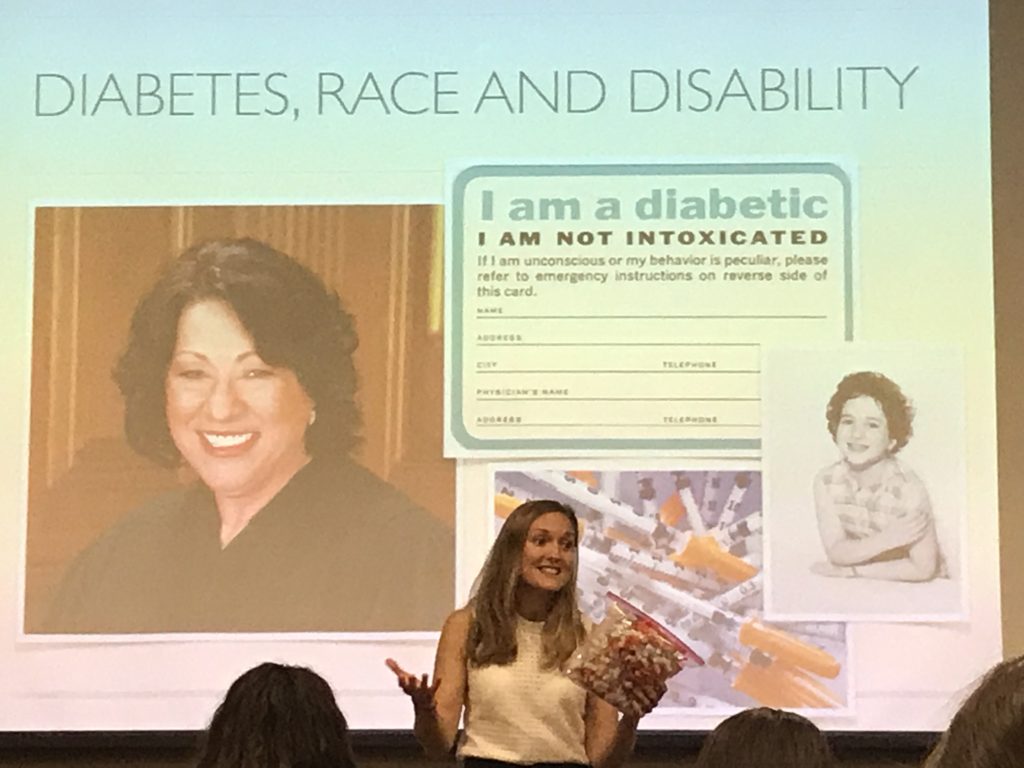Developing a Disability Legal Consciousness:Racism & Ableism in Special Education Advocacy
by Katie Warden, PhD candidate, Department of Sociology
My dissertation is an ethnographic study of the intersection of gender, race, and disability. Based on 20 interviews with Latino parents and 20 interviews with White parents and 100+ hours of participant observation, I examine the influence of race on how parents of kids with disabilities become advocates for their children in the special education system in Oregon. This research addresses two important gaps in our knowledge about disability. How do parents develop a positive understanding of disability and learn to advocate on behalf of themselves and their children? How do race, gender, and immigration status intersect with disability to create unique experiences, identities, and ways of knowing? Historically, and currently, the disability rights movement and disability studies have failed to include the experiences and voices of disabled people of color. Instead, advocates and scholars assumed that experiences of disability were universal across racial and ethnic groups. As a disabled White person who found a home in the disability rights movement, I am committed to making room within disability spaces for people of color to share their experiences of and perspectives on disability.
This project examines these issues through the lens of support groups for Latino and White parents of children with disabilities. Each month, once in Corvallis, once in Portland, and once in Salem, groups of Latina moms meet to share stories, knowledge, and advice, to learn about services and rights, to practice advocacy strategies, and to develop a more positive understanding of disability. These meetings are opportunities to observe the gendered nature of advocating for children with disabilities; fathers rarely attend and women report being the primary caregivers and advocates for their children at home, school, doctor’s appointments and other disability services. As these moms develop a disability legal consciousness, or move from a medical to a social model of disability, they learn to view disability as a legally protected identity, not a personal tragedy. In effect, together these moms confront and challenge the stigma of giving birth to a child with a disability, often seen as evidence of failed womanhood. Additionally, in these meetings, moms discuss how racial and gender stereotypes influence their interactions, and their children’s, with service providers. Moms consistently report hostility on the part of school administrators, teachers, and other personnel, in reaction to their advocacy efforts. They interpret this animosity as a response to the way their advocacy breaks stereotypes that Latinas are not rational, not knowledgeable, overly emotional, and docile women.

Participant observation of these Spanish language meetings is contrasted by my observation of an eight-week parent advocacy training program sponsored by a mainstream, predominantly White, disability rights organization. In the mainstream training, barriers and differences created by race and ethnicity were noticeably omitted from discussion, much as they are in the broader disability rights movement. Furthermore, advice given was often culturally or economically inaccessible to many parents. For example, at one training, parents were encouraged to find out the favorite Starbucks drink of their child’s teacher and bring that drink when meeting with the teacher. For economically-disadvantaged parents or rural parents this simply is not a feasible negotiation technique; for Latino immigrant parents cultural norms like this may not be part of their cultural toolkits. Finally, although Spanish language interpretation was provided at meetings, parents who used interpretation services sat in a back corner, visibly separated from the rest of the group.
Through observing support group meetings conducting interviews, I seek to understand the intersection of disability, race, gender, class, and nationality in the lives of these parents and how this intersection influences their thinking on and advocacy around disability. What does disability mean to them? How does it change their identity, their daily lives, their experience of the world? What is the experience of parenting a child with a disability like, as a Latino, a Spanish-speaker, an immigrant, in the Pacific Northwest, in this particularly racially-charged time? How does participation in an advocacy group change these parent’s experiences and thinking? What policies and structures could be put in place to support these parents, their families, and their children? Thanks to the support of CLLAS, among others, I hope to answer some of these questions in my dissertation.
—Katie Warden is a PhD candidate in the Department of Sociology. She holds a JD from George Washington University Law School and a BA in Latin American Studies and Spanish from the University of Oklahoma. Current research interests include discrimination, disability studies, and the sociology of law. Her dissertation examines the advocacy efforts of parents of kids with disabilities in Oregon.
